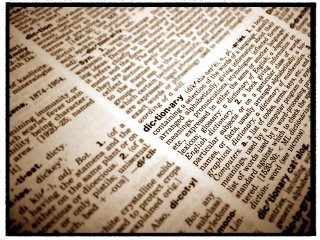
Definitions are wonderful and terrible. Wonderful because carefully chosen definitions bring thought into focus. But terrible because conflicting definitions are the source of endless misunderstandings. Try to define something carefully and it won't be long before someone suggests that "it's just semantics!" Translation: you're wasting your time on words instead of what really matters.
While I agree that it's invalid "to draw conclusions about what is true about the world based on what is true about a word" (I'm quoting from the Wikipedia page on semantics), that hardly makes semantics irrelevant! Semantics is, after all, the study of meaning. I don't imagine anyone has ever objected that "it's just meaning!"
The trouble is, some words carry around a lot of baggage. As I've just indicated, an unfortunate example is semantics itself! Lately, I've been thinking a lot about evidence. Not easy to define, but everybody seems to think it's a good thing. Similarly comments apply to science and research, both of which are favorites of advertisers—a sure sign that these words evoke powerful responses.
A couple of naive approaches to definitions deserve mention. One is simply to resort to a dictionary. This raises the (oddly recursive) question of whether dictionaries are or should be descriptive or normative. The fact that multiple definitions are often given for a word suggests a descriptive role. But I think that at the same time they try to be authoritative. The fact that different dictionaries sometimes offer strikingly different definitions suggests that this is an impossible task. Language is fluid in part because thought is fluid. Evolving concepts that are abstract and controversial don't submit to anyone's putative authority. So while dictionary definitions do provide grist for the mill, they're hardly
In my most recent post on evidence, I cited the Oxford English Dictionary, focusing not only on the definitions offered, but also on the etymology of the word. Word origins can inform a definition, but it's naive to rely on them exclusively. Science, for example, derives from the Latin scientia, meaning knowledge. Yet science surely means something different from simply knowledge.
For example, I know a number of quotes from Shakespeare's plays, but that kind of knowledge isn't science. The Wikipedia entry on science notes that science is often used informally to mean "any systematic field of study or the knowledge gained from it". For the sake of clarity let's call "the knowledge gained from it" scientific knowledge. But when we say science, do we really mean "any systematic field of study"? I would prefer to use the word research for that purpose. For example, I don't consider theology to be a science, but have no problem with the term "theological research".
Science, as I understand it, is fundamentally observational. I've made the same point about evidence, and I think the two are clearly related (but more of that in another post). An interesting test case is "computer science", sometimes known as "computing science" since its focus is really on computing more so than computers ("Computer science is no more about computers than astronomy is about telescopes." - Edsger Dijkstra). But is it a science? Well, the scientific method can be applied in computing science, in the design and analysis of empirical studies, but most of computing science is about mathematics.
And mathematics, while strongly associated with science, isn't a science. I believe that science is a good thing, but not all good things are science. I also believe that science gets at truth (and that's a challenging notion), but it's not the only thing that gets at truth. That the Earth revolves around the Sun is a truth established scientifically. Pythagoras' theorem in Euclidean geometry is a truth established mathematically. Both are objective truths in that anyone can, in principle, verify them. I suspect that there are also subjective truths that may be established using entirely different methods. The relationships between these different truths and the methods used to establish them strike me as profoundly interesting.
I still haven't offered a definition of science, and in fact I suspect that ultimately what may be most important is the pursuit of a definition rather than a definition per se. I would provisionally define science as the practice of the scientific method—clearly a bit of a dodge! The Wikipedia entries on science, the scientific method, and the philosophy of science provide useful background, but no clear consensus. I find myself in agreement of much of what is written in those entries, but not all of it. (For example, Karl Popper's perspective on science is prominent, but I have my doubts.)
Science, technology, and evidence-based medicine
Notably, discussions of science often focus exclusively on natural science. But the essence of science is careful observation and reasoning from observation, which clearly can be applied to any observable phenomena. This obviously includes human behaviour, notwithstanding the formidable obstacles that arise. The scientific method can also be applied in evaluating technology. Evidence-based medicine is an example of this. While natural science is of central importance in guiding the development of healthcare technologies—be they drugs, devices, surgical techniques, what have you—the evaluation of their performance is not a matter of natural science. The application of good science may lead to a technology that turns out not to work, or to have unanticipated adverse effects that preclude its adoption. Conversely, useful technology need not result from the application of science. Many drugs, for example, have come to us by non-scientific routes. Ultimately, regardless of their origins, healthcare technologies need to be evaluated to determine how well they work, and what adverse effects they may have. Why they work the way they do is of secondary importance.
No comments:
Post a Comment